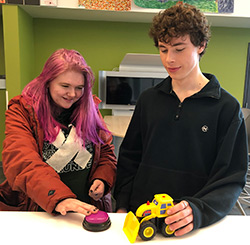Sophia Marin admitted it was a huge relief once she and her partner, Charnesha Bobo, finally were able to make their toy work.
“It was exciting because the outcome was what we wanted it to be,” said Sophia, a Kent Innovation High School student and senior at Lee High School.
What was the outcome? To be able to attach a variety of different switches to the toy so someone with limited mobility would be able to make the little red car light up and go “vroom.”
Sophia and Charnesha, a senior at Union High, were part of the senior capstone class at KIH led by teachers Julia Bierema and Rob Barrett, with student teacher Sam Alger. The class has multiple projects throughout the year in addition to the adapted toy project.
Press What Button?
Adapting toys has become an element of Grand Rapids Community College’s new, two-year occupational therapy assistant Program. Assistant Professor Robin Pegg used a project as part of activity analysis and planning.
GRCC students were each matched to a student from partner program Allegan Intermediate School District. The GRCC students analyzed a number of factors such as a child’s environment and specific skill level to determine how to adapt toys.
GRCC students were scheduled to deliver their toys to Allegan students later this month.
Once the KIH students had a clearer understanding of the need for adapted toys and how children would interact with them, they took a look at those they had collected.
“The problem is the button is too small for children who have a disability,” Sophia said of a yellow tractor that had a red button. “For most of the toys, the switch was too small.”
The toys needed a larger button, which might not seem hard to add, but students quickly learned that even the simplest of toys had a multitude of wires.
“Seeing all the wires and I got a little concerned,” Charnesha said. “Which wire do you cut? Which wire do you solder? It is all in the little details.”
Rockford High senior Gwenyth Jenkins said it was nerve-racking, in that she did not want to ruin the toy by soldering the wrong wire.
“When we play with a toy, we take it for granted that anyone is going to be able to press a button, but that is not the case… When (they are) finally able to play with a toy like their sister or brother can, well, it is pretty amazing to see their reaction.”
— Ron Houtman, REMC 8/Kent ISD education technology consultant
Ron Houtman, REMC 8/Kent ISD education technology consultant, told them failure is OK. Critical thinking skills such as trouble-shooting, problem-solving and being able to figure out a task on your own are what employers are looking for, he said, and failure helps develop those skills.
Next Project: Check Your In-Box
The project started when Houtman sent a flier asking for toy donations. He and Kindy Segovia host AssisTechKnow, an October technology conference focused on applied assistive technology for special education practitioners, occupational therapists, physical therapists, and speech and language therapists.
“We were not sure what (project) we were going to do next,” Bierema said. “Once we saw the flier, we knew this was it.”

Houtman is familiar with the need for adaptive toys: the REMC 8 assistive technology lending library provides materials to teachers and has adapted toys and switches designed to accommodate many levels of mobility.
An adapted toy can start at $50, and the components to adapt it can drive up the price as well. A commercial battery disruptor starts at $15, and a switch can cost between $50 and $80.
Houtman and Segovia, Kent ISD’s assistive technology coordinator, planned a workshop session on adapting toys at the October conference. The plan was to demonstrate how to adapt a toy and then donate the adapted toys to those who might benefit from them.
In January, Bierema and Barrett met with Houtman, who was supportive of the capstone project.
“When we play with a toy, we take it for granted that anyone is going to be able to press a button, but that is not the case,” Houtman said. “This was an opportunity to have the students build an adaptive toy, and learn how others with disabilities play with these toys.”

Trying New Things
KIH students admitted that when they first heard about the project — which includes taking toys apart, re-wiring and soldering — they were not as enthusiastic.
“To be honest, I personally didn’t know anything about electronics or soldering things together,” said Beau Bowers, a Forest Hills Central senior who said he plans to study writing after high school. “I didn’t know what I was going to be doing.”
Added Gwenythn: “I thought I was going to fail the project.”
Students brainstormed a toy drive at KIH. They invited a guest speaker from Mary Free Bed Rehabilitation Center to talk about empathy, along with the need for adapted toys and how children with limited mobility play with them. Houtman also demonstrated switches and circuits, and how to solder.

It moves! It moves!
KIH students adapted about six toys, which will be given to Mary Free Bed for patient use. Bierema said they plan to bring the toys to the facility and see first-hand how the toys are used.
“When a student is finally able to play with a toy like their sister or brother can, well, it is pretty amazing to see their reaction,” Houtman said.
Gwenyth said she could relate to that feeling, especially after successfully getting the yellow toy tractor rewired and connected to a new large push button.
“We were just so excited,” she said. “We were the first ones to finish, and we were so proud of ourselves. We came into this project not sure what we were doing and we were able to make it do something.”















